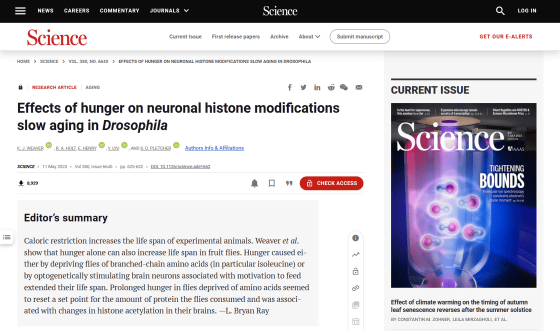``Feeling hungry'' rather than calorie restriction itself may delay the aging process of the body

Previous
Effects of hunger on neuronal histone modifications slow aging in Drosophila |
https://doi.org/10.1126/science.ade1662

The feeling of hunger itself may slow aging in flies | Michigan Medicine
http://www.michiganmedicine.org/health-lab/feeling-hunger-itself-may-slow-aging-flies
Simply Feeling Hungry Might Be Enough to Slow Down The Aging Process : ScienceAlert
https://www.sciencealert.com/simply-feeling-hungry-might-be-enough-to-slow-down-the-aging-process
Recent animal studies suggest that caloric restriction may extend lifespan and promote health, but more support is needed to extend these studies to humans. Therefore, a research team led by Scott Pletcher , a professor of physiology at the University of Michigan, used fruit flies , which have useful similarities with mammals in metabolism and brain, to investigate the relationship between ``feeling hungry'' and the aging process. We conducted an experiment to investigate the
Previous studies have already identified the neural signals that Drosophila perceive hunger and satiety, and it is known that branched-chain amino acids (BCAAs), which are essential nutrients that make up proteins, cause satiety. In other words, fruit flies feel full when they eat foods rich in BCAAs, and conversely, eating foods deficient in BCAAs does not reduce hunger.

To investigate whether hunger or actually eating food is involved in the aging process, the research team fed fruit flies a snack low in BCAAs, and found that ``hunger persists despite food intake. ” was created.
A few hours after feeding the BCAA-poor snack, the researchers fed the flies ad libitum on carbohydrate- or protein-rich foods. As a result, the fruit flies ate more protein-rich foods than carbohydrates, suggesting that hunger was based on needs rather than mere desire.
Drosophila that ate snacks low in BCAAs ate more food and calories than those that did not. However, the researchers report that fruit flies fed a lifelong low BCAA diet lived significantly longer than individuals fed a high BCAA diet.
In addition, the research team used
``We found that the life-prolonging effects of dietary restriction were separable from the nutritional manipulations researchers had been working on for years,'' Pletcher said. . ``We created an unsatisfied hunger in flies, which made them live longer,'' said Dr. Christy Weaver, lead author of the paper.

Further research found that reducing BCAAs in the fruit fly diet altered proteins called histones in neurons involved in hunger. Histones bind to DNA and control gene activity, and the research team believes that altered histones link diet, starvation, and aging.
Based on the results of this study, the research team speculates that chronic hunger may change histones in individual neurons and delay aging. However, further research is needed to know whether these findings can be applied to humans.
Related Posts:
in Science, Posted by log1h_ik







